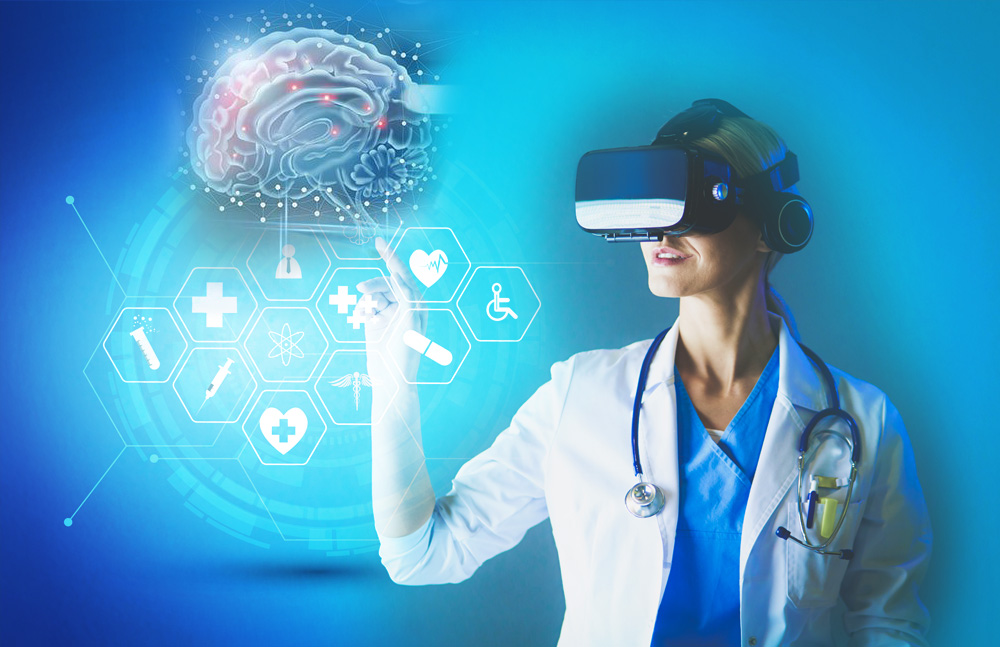In recent years, the healthcare industry has been undergoing a transformation driven by technological advancements, and one of the most influential forces in this change is artificial intelligence (AI). AI is revolutionizing the way healthcare is delivered, from improving diagnostic accuracy to streamlining administrative processes. It has the potential to enhance patient care, reduce costs, and make healthcare services more accessible. In this article, we will explore the profound impact of artificial intelligence on healthcare, with a particular focus on how it’s reshaping the industry.
AI in Diagnostics
One of the most significant contributions of AI in healthcare is in diagnostics. AI algorithms can process vast amounts of medical data, such as patient records, medical images, and clinical research, to provide more accurate and timely diagnoses. These algorithms can detect patterns and anomalies that may go unnoticed by human physicians, potentially saving lives in the process.
For example, AI-powered image recognition systems have shown exceptional performance in interpreting medical images, including X-rays, MRIs, and CT scans. These systems can detect abnormalities in scans with a high degree of accuracy, assisting radiologists in making quicker and more precise diagnoses.
Moreover, AI is being used to analyze genetic data to predict an individual’s susceptibility to certain diseases. By identifying genetic markers associated with various conditions, AI can help in the early detection of diseases, allowing for preventive measures or early interventions. This personalized approach to healthcare is a game-changer, ensuring that patients receive the right treatment at the right time.
Enhancing Drug Discovery
Drug discovery is a time-consuming and expensive process in the pharmaceutical industry. AI is making strides in expediting this process by analyzing vast datasets to identify potential drug candidates more efficiently. It can predict how a drug will interact with the human body and its efficacy, reducing the need for costly and time-consuming laboratory experiments.
Additionally, AI is playing a pivotal role in repurposing existing drugs for new therapeutic uses. By analyzing existing drugs and their known effects, AI can uncover potential treatments for diseases that were not initially considered.
Streamlining Administrative Tasks
AI is not limited to clinical applications; it is also revolutionizing healthcare administration. Hospitals and healthcare facilities are using AI-driven systems to manage administrative tasks more efficiently. For example, chatbots and virtual assistants can handle appointment scheduling, answer patient inquiries, and assist with administrative paperwork.
AI is also employed in managing electronic health records (EHRs). These records contain a wealth of information about patients, and AI can help organize and extract relevant data for healthcare providers. It streamlines the process of accessing patient histories and assists in making more informed treatment decisions.
Telemedicine and Remote Monitoring
The rise of telemedicine has been accelerated by AI. Patients can now consult with healthcare professionals from the comfort of their homes, thanks to AI-powered telehealth platforms. These platforms enable secure video consultations, allowing patients to discuss their symptoms and receive medical advice without the need for in-person visits.
AI also plays a crucial role in remote patient monitoring. Wearable devices and sensors can collect real-time health data, such as heart rate, blood pressure, and glucose levels, and transmit this information to healthcare providers. AI algorithms can then analyze the data, alerting healthcare professionals to any concerning trends or anomalies. This proactive approach to patient care helps in early intervention and reduces the risk of complications.
Challenges and Ethical Considerations
While AI offers remarkable potential to transform healthcare, it also presents challenges and ethical considerations. Privacy and data security are paramount concerns, as the handling of sensitive patient information must be done with the utmost care. Ensuring that AI systems are transparent and explainable is essential, particularly when it comes to diagnostic decisions made by AI algorithms.
Additionally, there is a concern about the potential for bias in AI algorithms. If the data used to train AI models is not representative of the entire population, it can lead to biased recommendations and diagnoses. It’s essential to address these biases to ensure equitable healthcare delivery.
The Role of AI in Dental Care
Now, let’s focus on the role of AI in dental care. While the keyword “Best dental clinic in Abu Dhabi” is introduced here, it’s important to note that the dental field has also seen the integration of AI technologies to enhance patient care and treatment outcomes. AI can assist dentists in various ways, including image analysis for diagnosing oral conditions and treatment planning, as well as patient management.
AI-powered imaging systems can analyze dental X-rays and scans to identify dental issues such as cavities, gum disease, and even oral cancer. These systems can provide dentists with a more comprehensive view of a patient’s oral health, leading to more accurate diagnoses and treatment recommendations. Additionally, AI can assist in treatment planning, helping dentists determine the best approach for procedures such as orthodontics and dental implants.
In patient management, AI can help dental clinics streamline appointment scheduling and manage patient records efficiently. Chatbots and virtual assistants can handle appointment bookings and patient inquiries, improving the overall patient experience.
The Future of Healthcare with AI
As AI continues to evolve and its capabilities expand, the future of healthcare is set to become even more connected, data-driven, and patient-centric. AI-driven predictive analytics will help healthcare providers identify trends and potential health crises before they occur. This proactive approach to healthcare will not only save lives but also reduce the financial burden on patients and healthcare systems.
Moreover, AI will continue to play a vital role in making healthcare more accessible to underserved populations, especially in remote or resource-constrained areas. Telemedicine, remote monitoring, and AI-driven diagnostics will bridge the gap and ensure that quality healthcare is available to a broader segment of the population.
In conclusion, artificial intelligence is transforming healthcare in profound ways, from diagnostics to drug discovery and administrative tasks. It holds the potential to improve patient outcomes, enhance efficiency, and reduce costs. However, it also comes with challenges that must be addressed, including privacy, bias, and transparency. The integration of AI in dental care, as exemplified by the “Best dental clinic in Abu Dhabi,” is just one facet of this broader healthcare transformation. The future of healthcare with AI is promising, and its positive impact is already being felt by patients and healthcare providers worldwide.

